Madeleine Albright: First female secretary of state
Before Albright, the inner sanctum of US foreign policymaking had been an almost exclusively male domain
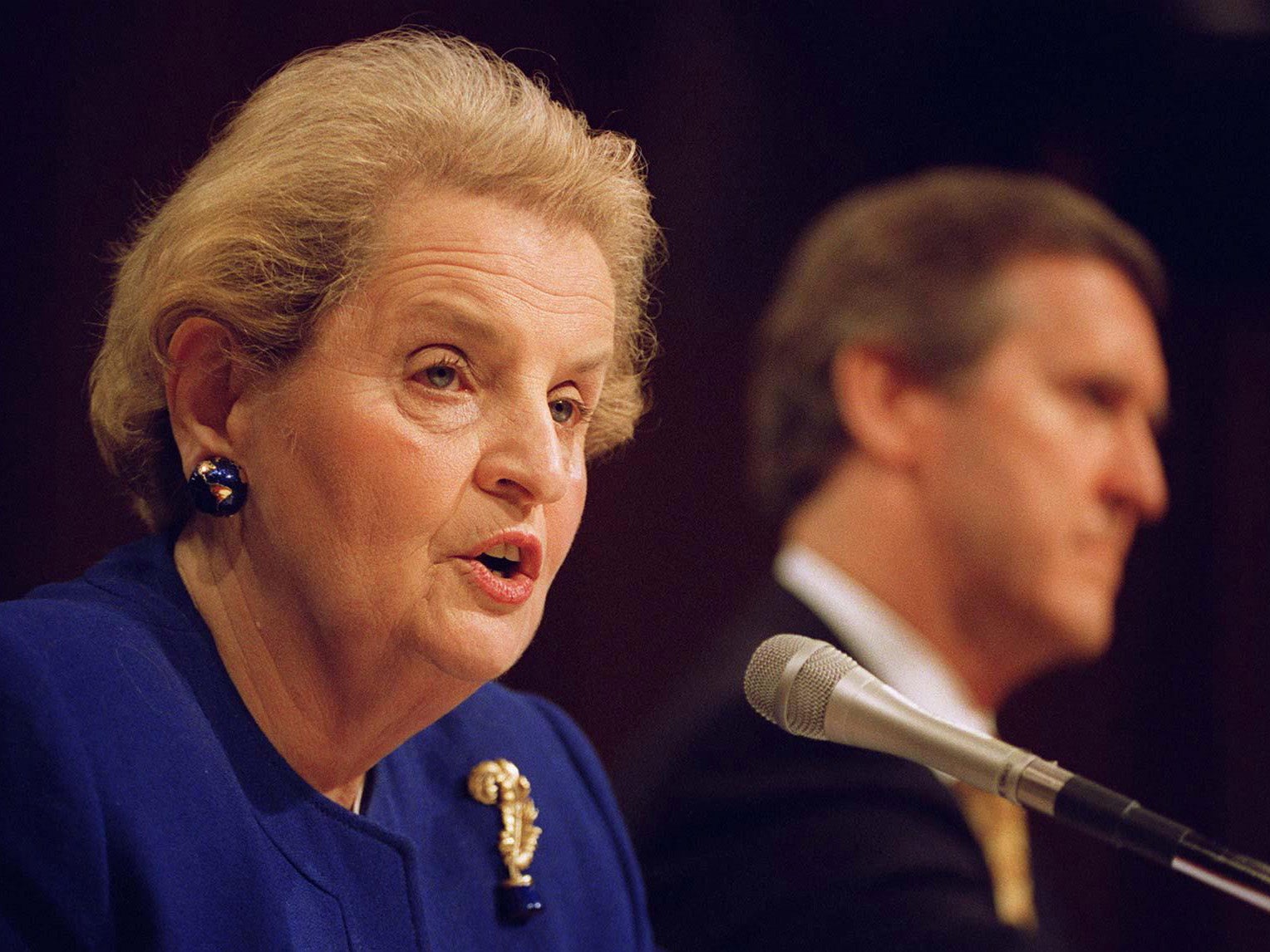
Madeleine K Albright, who came to the US as an 11-year-old political refugee from Czechoslovakia and decades later was an ardent and effective advocate against mass atrocities in Eastern Europe while serving as ambassador to the United Nations and the first woman secretary of state, has died aged 84.
Before Albright, the inner sanctum of US foreign policymaking had been an almost exclusively male domain. In many ways, her politically fraught early life – enduring Nazi and communist repression – impelled her rise to the highest levels of international politics. Her family, which was Jewish, narrowly avoided extermination at the hands of the Nazis; they fled to England shortly after Hitler’s tanks rolled into Czechoslovakia in 1939.
Several of Albright’s relatives, including three grandparents, died in the concentration camps of Theresienstadt and Auschwitz. After the war, Albright’s father, a Czech diplomat wary of communism, feared he would be arrested following a 1948 coup by hard-line Stalinists in Prague. The family escaped once more, this time to the US.
Her ascent in the foreign policy establishment reflected the traditional roles of women in the 1950s and 1960s and her ambition, influenced by the nascent feminist movement, that encouraged women to pursue professional careers.
After studying political science at the all-female Wellesley College, she married a wealthy newspaper heir and began a family. When her twin daughters were born prematurely and placed in incubators, Albright passed time in the hospital by teaching herself Russian.
She became an influential Georgetown salon leader and skilled fundraiser at Beauvoir, the elite private school in Washington that her daughters attended. In 1976, she earned a doctoral degree in public law and government at Columbia University, where she studied under Zbigniew Brzezinski, a fellow refugee from Eastern Europe.
When Brzezinski was named national security adviser following the 1976 election of Jimmy Carter as president, he brought Albright into the White House as his congressional liaison. She was one of just two women on Brzezinski’s staff and occupied a windowless cubbyhole in the West Wing, but Albright relished her proximity to power.
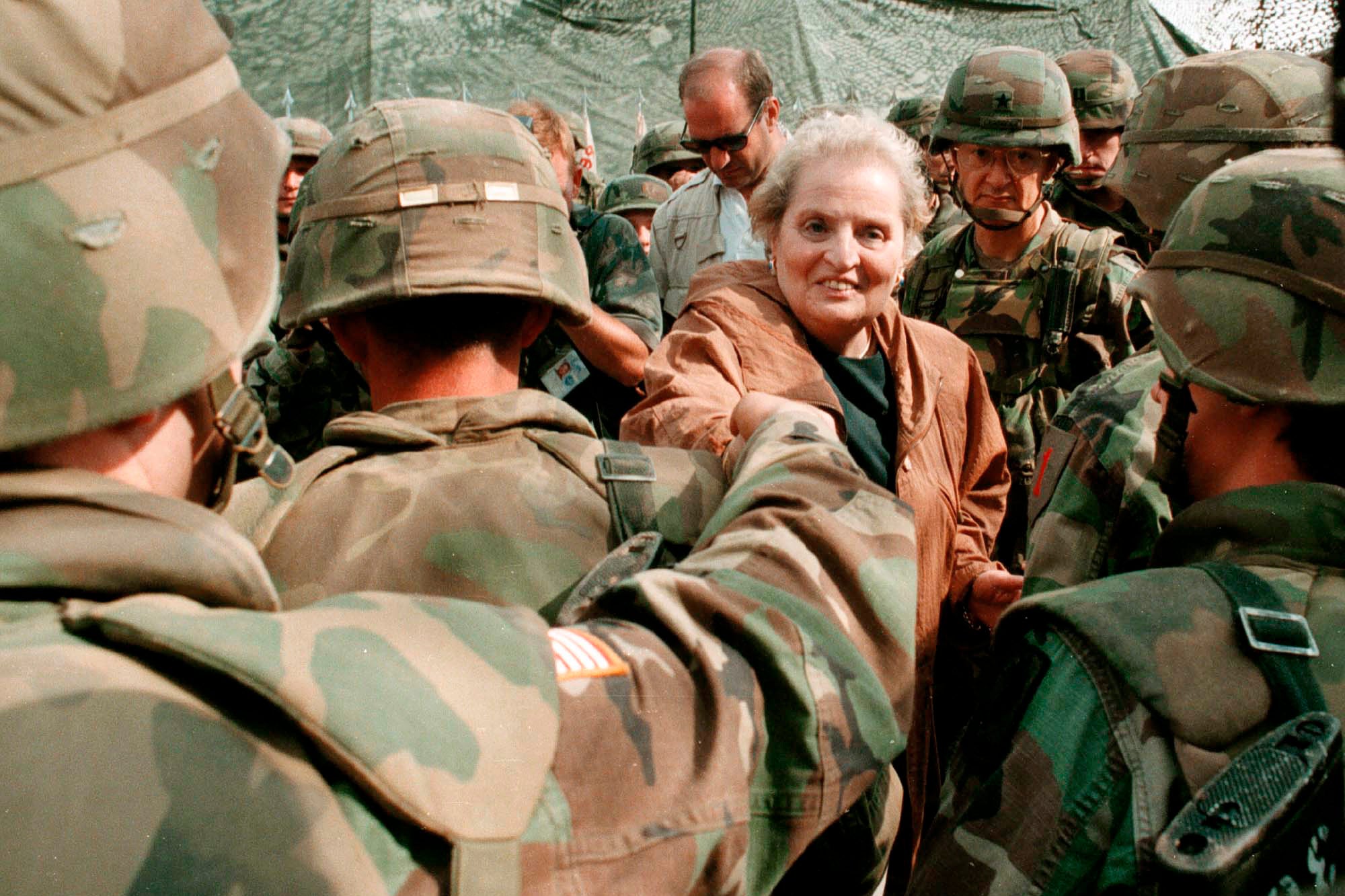
The biggest catalyst to Albright’s career may have occurred in 1982 when her husband left her for another woman. Although she was initially devastated, the divorce settlement made her a millionaire.
She began raising money for Democratic presidential hopefuls, which led to jobs as foreign policy adviser to representative Geraldine Ferraro, the first woman to run for vice president, and to Massachusetts governor Michael Dukakis, during his doomed 1988 presidential run.
While working for Dukakis, Albright met Bill Clinton, a onetime Rhodes scholar who was then-governor of Arkansas and wanted to build a national reputation for himself. Albright wrote a letter of recommendation that helped Clinton gain membership to the Council on Foreign Relations, a prestigious New York think tank. When Clinton was elected president in 1992, Albright ran his National Security Council transition team and was named ambassador to the UN.
Like many immigrants from the Second World War generation, Albright saw her adopted homeland as a moral beacon and an “indispensable nation” for resolving international conflicts. As Clinton’s top envoy, she argued for vigorous US engagement abroad at a time when many Americans saw the end of the Cold War as a signal for their government to focus on domestic problems.
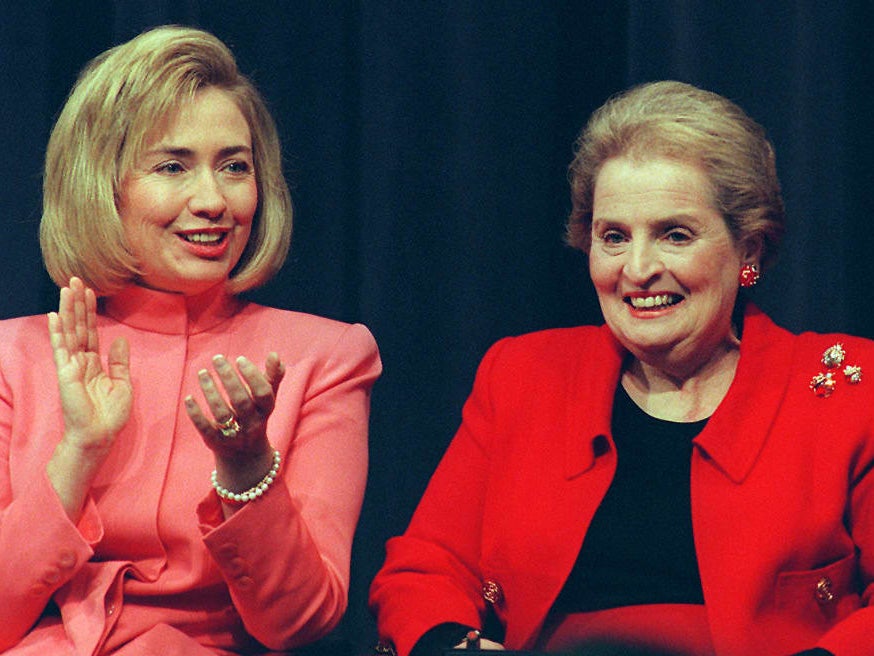
Rather than relying on the US to be a global lone ranger, Albright argued for its involvement in what she called “assertive multilateralism”. She lobbied – not always successfully – for muscular multinational responses to thwart a new generation of tyrants, from Haiti to Rwanda to the Balkans.
Comfortable in front of TV cameras, Albright emerged as the administration’s most forceful foreign policy advocate and a stark contrast to Clinton's first secretary of state, the cautious and wooden Warren Christopher, and the media-shy national security adviser Anthony Lake.
Albright tried to back up her strong words, especially following the breakup of Yugoslavia in the early 1990s.
In the newly created state of Bosnia and Herzegovina, scenes of ultranationalist Serbian paramilitaries forcing Bosnian Muslims aboard railroad cars reminded Albright of the Holocaust. Initial paralysis by the international community and by Clinton, who feared getting stuck in a Vietnam-like quagmire, infuriated Albright. She pushed for military action.
“She could not stand doing nothing on Bosnia,” Toby Gati, who was then the intelligence chief at the State Department, told former Washington Post journalist Michael Dobbs in his 1999 biography, Madeleine Albright: A Twentieth-Century Odyssey. “She was like a horse chomping at the bit all the time. She kept on saying, ‘We have to do more.’”
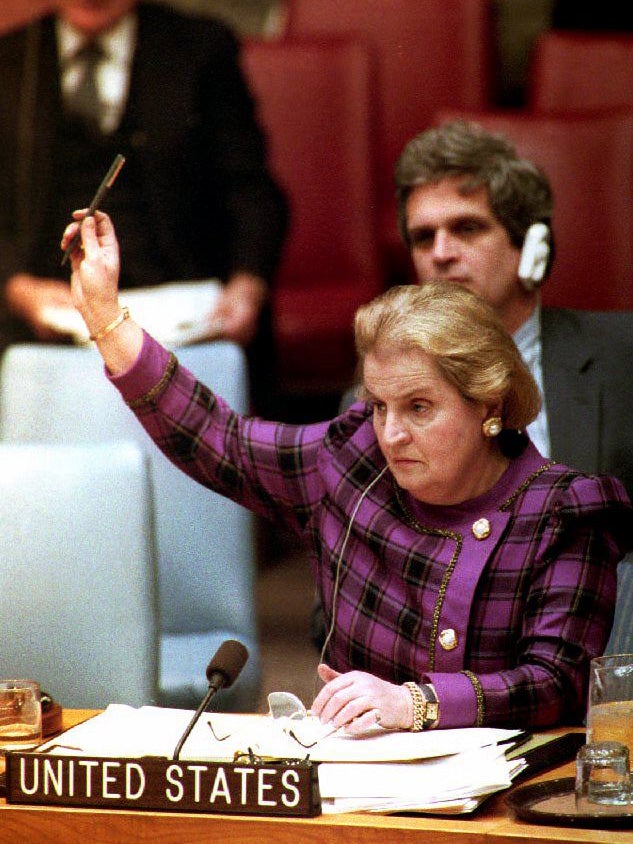
At the UN, Albright lobbied for airstrikes against Serbian positions. At one point she stunned Colin Powell, who was then chairman of the Joint Chiefs of Staff and reluctant to intervene, by asking: “What's the point of having this superb military you're always talking about, if we can't use it?”
Recalling the scene in his memoirs, Powell wrote: “I thought I would have an aneurysm. American GIs were not toy soldiers to be moved around on some sort of global game board.”
After Serb forces overran Srebrenica and massacred thousands of civilians in June and July of 1995, White House opinion finally swung to Albright’s position. The first airstrikes, carried out by Nato forces, were launched in September 1995 and helped drive the Bosnian Serbs to the bargaining table.
Two months later, the Dayton peace accords, brokered by US envoy Richard C Holbrooke, ended the war in which an estimated 100,000 people died.
Albright’s unwavering stance on Bosnia as well as a strong recommendation from her good friend, first lady Hillary Rodham Clinton, helped convince President Clinton to promote her to secretary of state after he won a second term, with enthusiastic support from female voters.
She was confirmed as the 64th secretary of state – the office is fourth in the line of presidential succession – by a 99-0 vote in the US Senate.
As the top US diplomat, she quickly became the administration’s chief hawk on Kosovo, where Yugoslav leader Slobodan Milosevic had ordered a bloody crackdown in the largely ethnic Albanian-inhabited province.
Albright, who had lived in Belgrade when her father was the Czech ambassador, had for years lambasted Milosevic for human rights abuses. In what Time magazine dubbed “Madeleine's War”, Nato airstrikes in 1999 eventually led to the withdrawal of Yugoslav forces and the return of thousands of Albanian refugees. By standing up to Milosevic, National Security Council European Director Ivo Daalder said, “Albright got Kosovo right.” Milosevic was charged by an international tribunal with war crimes but died in 2006 before the trial ended.
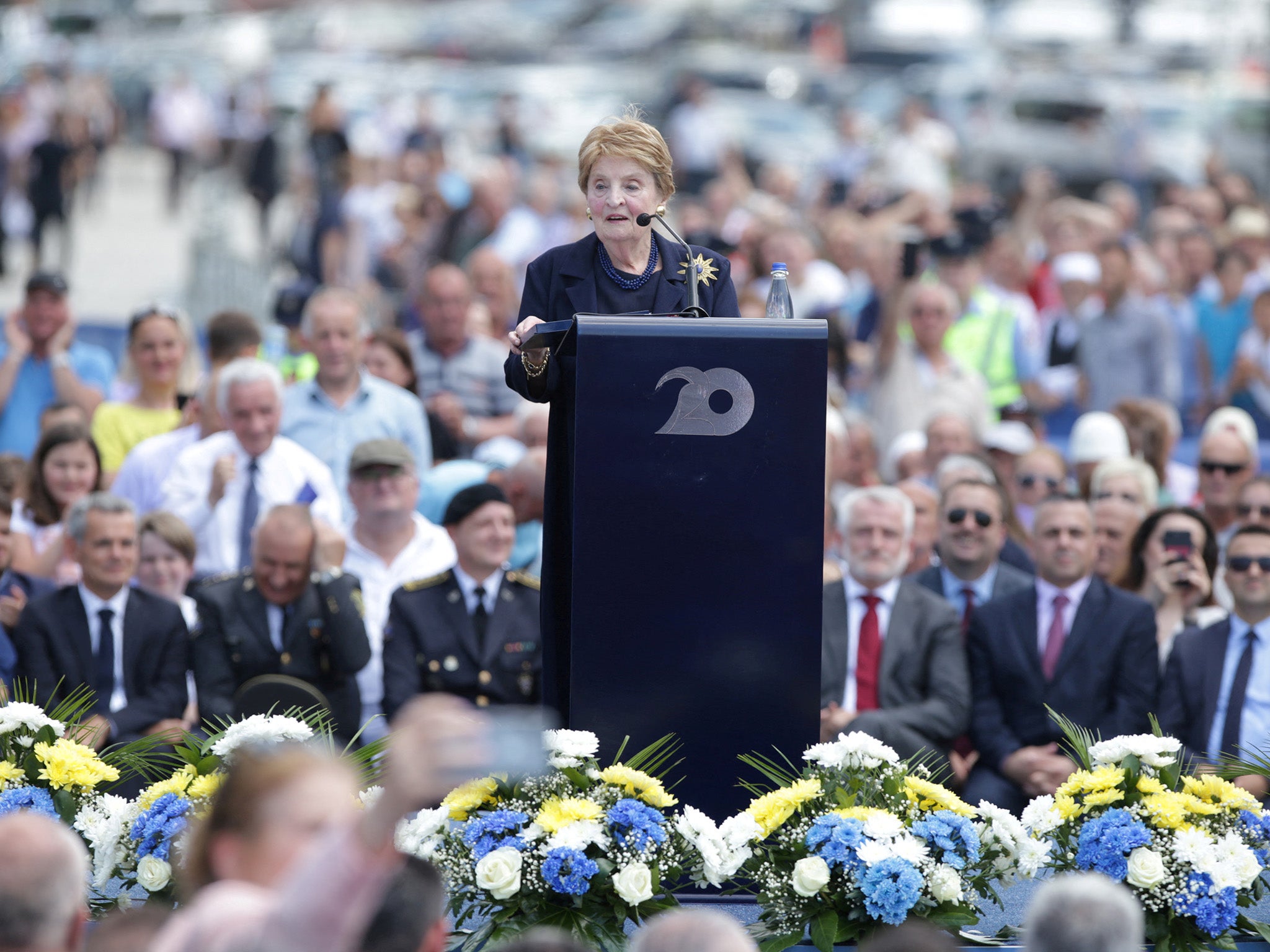
Albright saw a stable Europe as central to US interests and was convinced that Warsaw Pact countries should be aligned with the west in order to cement democratic gains achieved since the fall of the Berlin Wall.
After six years of transatlantic diplomacy, Albright helped convince Russia and a sceptical US Senate to allow Poland, Hungary and the Czech Republic to join Nato. It may have been her greatest diplomatic achievement.
Her dedication to the region made her a star in Eastern Europe, prompting her close friend, Czech president Vaclav Havel, to suggest that Albright succeed him.
Maria Jana Korbel was born in Prague on 15 May 1937. Her mother later rechristened her Madeleine, which evolved from her childhood nickname Madlenka. With Jewish peoples facing discrimination and death all across Europe, the Albright family converted to Catholicism while living in London during the Second World War.
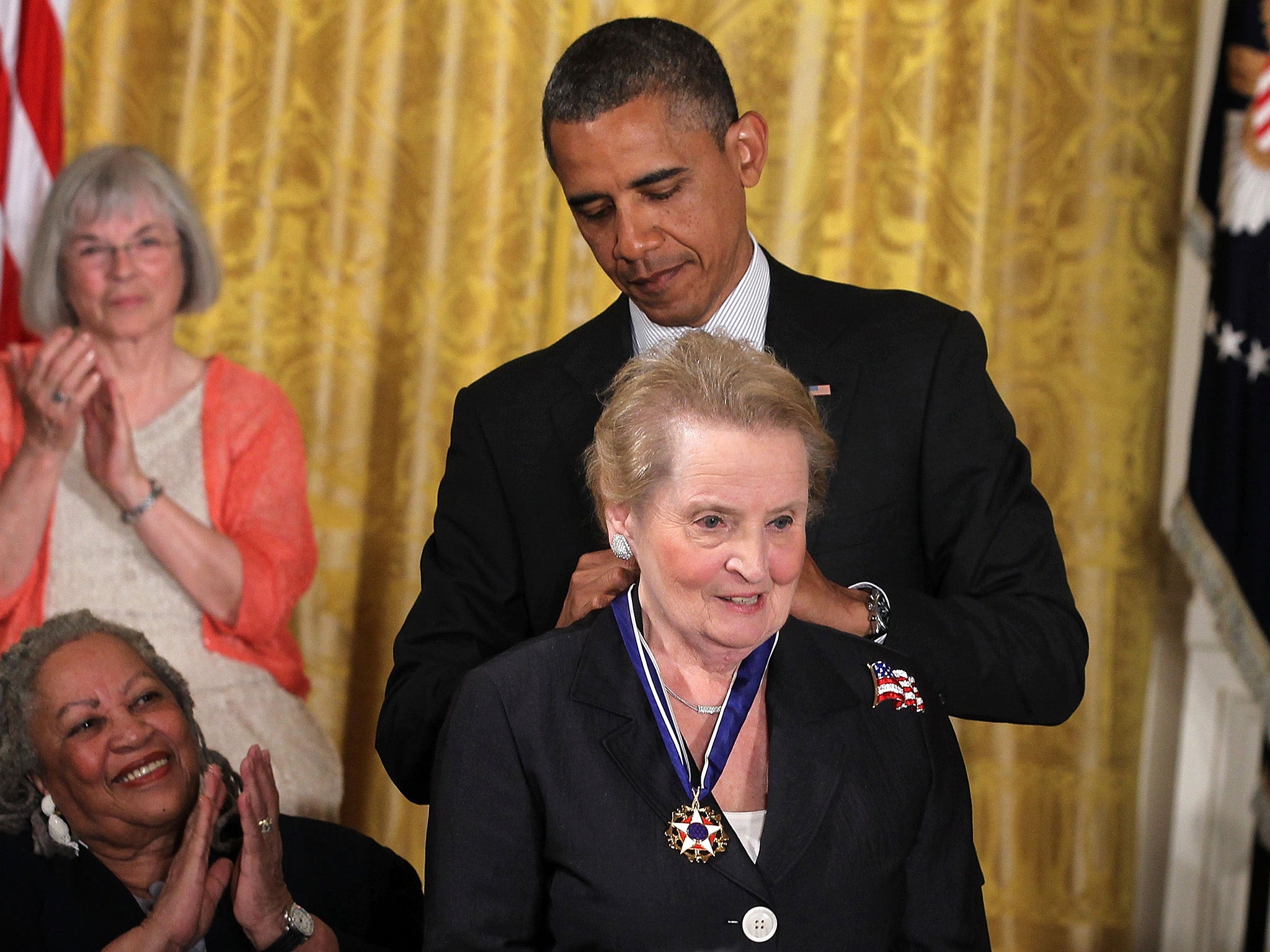
She adored and emulated her father, Josef Korbel, who, after moving the family to Colorado, taught international relations at the University of Denver – where he mentored future secretary of state Condoleezza Rice.
Days after graduating in 1959 from Wellesley, she married Joseph Medill Patterson Albright, a newspaper scion she’d met while working as an intern at the Denver Post.
After more than 20 years of marriage, he announced that he was leaving her for another woman. The terms of the divorce left her the house in Georgetown and a 370-acre farm near Washington Dulles International Airport and a stock portfolio worth $3.5m (£2.65m) by the time she joined the Clinton administration, The Washington Post reported.
As secretary of state, Albright was known as a cold-blooded bureaucratic warrior. Despite resistance from nearly every member state, she led a successful US effort in 1995 to deny a second term to UN secretary-general Boutros Boutros-Ghali, who was viewed in Washington as ineffective.
Inside the State Department, Albright never fully trusted many of her male deputies, who had wanted the top job, and was convinced they were maligning her behind her back, her biographer Ann Blackman said. Privately, Albright called them, “The White Boys”.
Her initiatives were often blocked by the risk-averse White House where Clinton’s national security advisers often wielded more influence than Albright.
Following the disastrous effort to stabilise the African nation of Somalia in 1993, her pleas the next year to intervene in Rwanda to stop the genocide of ethnic Tutsis fell on deaf ears among White House staff and the public.
“Goddammit, we have to do something,” she screamed at her bosses in one telephone call. Instead, Albright was ordered to veto a UN plan to send a multinational force into the Rwandan capital of Kigali. She remained haunted by Rwanda and recalled flying over the killing fields and seeing hundreds of skeletons, including one she later said “that was only 2ft long, about the size of my little grandson”.
After leaving government in 2001, Albright became chairwoman of the Albright Stonebridge Group. She returned to teaching at Georgetown and wrote several books, including Prague Winter, a memoir of her dramatic childhood. In 2012, she received the Presidential Medal of Freedom, the country’s highest honour for civilians.
Albright delighted in telling the story of how one of her granddaughters was less than impressed with her illustrious career. Noting that after Albright, two of the next three secretaries of state were women, the seven-year-old commented: “What’s the big deal about Grandma Maddie having been secretary of state? Only girls are secretary of state.”
Madeleine Albright, former US secretary of state and diplomat, born 15 May 1937, died 23 March 2022
© The Washington Post


Bookmark popover
Removed from bookmarks